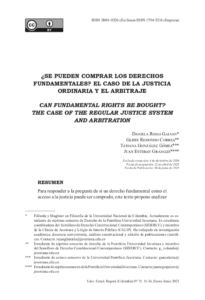SE PUEDEN COMPRAR LOS DERECHOS FUNDAMENTALES? EL CASO DE LA JUSTICIA ORDINARIA Y EL ARBITRAJE
CAN FUNDAMENTAL RIGHTS BE BOUGHT? THE CASE OF THE REGULAR JUSTICE SYSTEM AND ARBITRATION
Daniela Rojas Galvan, Glissy Redondo Correa, Tatiana González Gómez, Juan Esteban Grajales
Resumen
Para responder a la pregunta de si un derecho fundamental como el acceso a la justicia puede ser comprado, este texto propone analizar la posibilidad de su mercantilización. Para ello, se examinará qué es un derecho fundamental y se establecerá la relación entre el arbi- traje y la administración de justicia, incluyendo su forma de mate- rialización. Posteriormente, se analizará cómo la incorporación del arbitraje introduce una lógica de mercado en el acceso a la justicia, y cómo esta puede afectar su carácter de derecho inalienable. A través de un ejercicio de comparación entre el arbitraje y la justicia ordinaria, se identifican tanto las ventajas como las limitaciones y barreras que crea cada sistema. El análisis revela que la justicia se ha visto envuelta en dinámicas mercantiles que han generado una brecha entre dos sistemas: uno ágil pero costoso; otro gratuito pero saturado. Esta coexistencia plantea un conflicto entre una justicia orientada por intereses privados y económicos, y una justicia pú- blica concebida como bien colectivo, accesible y universal, lo que pone en riesgo los principios de equidad y justicia social en un Estado Social de Derecho.
Abstract
To address the question of whether a fundamental right such as the access to justice can be bought, this text proposes an analysis of its potential commodification. To that end, it will first examine what constitutes as a fundamental right and establish the relationship be- tween arbitration and the administration of justice, including how this relationship materializes. Subsequently, it will explore how the incorporation of arbitration introduces a market logic into access to justice, and how this may affect its status as an inalienable right. Through a comparative analysis of arbitration and the regular justice system, the advantages, limitations, and barriers of each system will be identified. The analysis reveals that justice has become entangled in market dynamics, leading to a gap between two systems: one that is swift but expensive, and another that is free but overburdened. This coexistence raises a conflict between a form of justice driven by private and economic interests and a public justice conceived as a collective, accessible, and universal good—thus putting at risk the principles of equity and social justice in a Social Rule of Law.
Palabras clave
Acceso a la justicia
mercantilización
equidad
arbitraje
justicia ordinaria
Keywords
Access to justice
Commodification
Equity, arbitration
regular justice system
URI
http://hdl.handle.net/10554/69933
Colecciones
Universitas Estudiantes No. 31 - enero-junio 2025; ISSN 1794-5216 (impresa) / ISSN 2806-0326 (en línea)
SE PUEDEN COMPRAR LOS DERECHOS FUNDAMENTALES?

